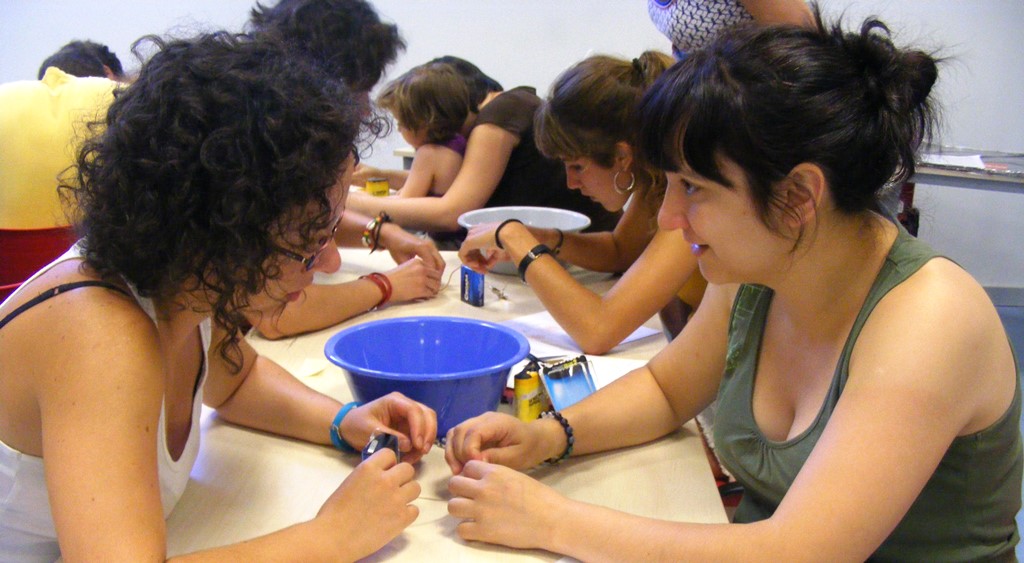Active and participatory methodologies for training critical thinking, analytical strength and the skill to discern reliable information.

In the digital age, information is just a click away. We can find the answers to a lot of questions and learn about virtually any subject; the era of the democratization of knowledge. But, how can we tell apart reliable information from falsehood?
It’s becoming more and more important for our students to acquire the learning tools that will allow them to know if a source is valid, tools that will help them distinguish the most common fallacies and argumentative tricks.
Instead of telling them “this is true” or “this is false”, in this course we will teach through a series of active and participatory activities that allow to understand through experience how knowledge is built in order to know how to recognize tricks easily.
Objectives:
- Acquire active methodological tools that encourage the participation, cooperation and motivation of learners.
- Reflect on the importance of educating in critical thinking and taking an autonomous approach when searching for information.
- Teach methodological tools to train critical thinking.
- Know the main fallacies/argumentative tricks and how to distinguish them.
- Generate critical debate around information overload and how that shapes our society.
- Understand the scientific method and how it is implemented in Social and Natural Sciences.
Target audience:
Teachers from secondary schools, teacher trainers, school leaders and professional workers that are interested in teaching critical thinking.
For groups of 8 teachers or more, we adapt the course content, approach the specific needs of your educational center and offer personalized funding assistance.
Training activities:
Day 1
- Course introduction
- Group dynamic: Getting to know each other
- Reflection exercise: What is knowledge?
- Group activity: Biases and fallacies/argumentative tricks
- Group experiment: Improve your intelligence
- Hands-on activity: Analysis of newspaper articles
Day 2
- Group dynamic: Breaking the ice
- Practical activity: The Scientific Method
- Group experiment: Find the right assertion
- Group activity: Hunters by the method
- Individual activity: Detection of prejudice
- Hands-on activity: Data analysis
Day 3
- Group dynamic: Energizer for encouraging collective learning
- Group experiment: Experiments and demonstrations
- Group dynamic: Generating an open attitude in the group and raising energy
- Reflection and group discussion: Identify and compare different methodologies
Day 4
- Group dynamic: Energizer for fostering collective learning
- Rejection and discussion: What can other disciplines learn from Science?
- Group activity: Numbers that lie
- Hands-on activity: The rigor of Social Sciences
Day 5
- Group dynamic: Energizer for encouraging team building
- Reflection in small groups: Critical Thinking in the age of the Internet
- Final hands-on activity: Blind data collection
- Open discussion on possible future collaborations and planning follow up activities
- Summary of key learning points
- Final course evaluation and feedback
- Validation of learning outcomes and handling certificates
- Cultural activity or guided visit (optional)
Methodology
The scientific method is a human legacy that has allowed us to reach deep in our search for knowledge, but the way it is taught in schools, often too theoretical, does not allow it to reach its full educational potential as a way of thinking. That is why we bring forward hands-on activities that show the importance of using a systematic approach and hard work to reach results in order to see where right assertions come from and what value they have.
And so we will explore how the learning of the scientific method can be used as a basis for the stimulation of critical thinking, which is very important for discriminating reliable information in the era of information overload. This can be applied in other areas too, like Social Sciences, or just everyday questions, so they can be answered through the Internet or by reading the newspaper.
Energizers, games and group dynamics are foreseen daily in order to ensure a positive energy and a cooperative learning climate in the group.
Group reflections and daily brief feedback sessions are planned to help adapting the learning programme to the specific needs of the participants.
We organize optional social and cultural activities in order to give the participants the opportunity to get to know the Canarian and Spanish culture as well as to do some professional networking and exchange good practices.
Certification and validation of learning outcomes
- Certificates of attendance, including a description of the training content
- Support with the Europass mobility certificates – to be issued by the applicant’s National Agency
Upon request, we also provide educational centers with additional documents that are required to certify the presence to the course and the competences learned. For example, we provide photos of the training course that can be used for dissemination purposes.
Pre-register to our course!
Write us some details about your project idea. How many participants do you want to send? What are the profiles of the teachers/staff interested in the course?
